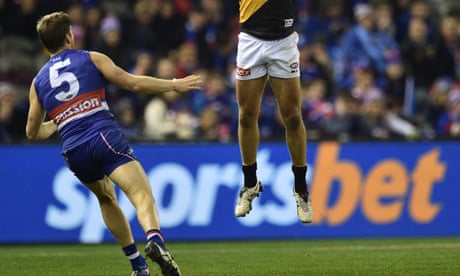- by foxnews
- 08 Apr 2025
‘Dangerous and deluded’: advocates and MPs criticise sporting codes for pushback on gambling reform
‘Dangerous and deluded’: advocates and MPs criticise sporting codes for pushback on gambling reform
- by theguardian
- 22 Dec 2022
- in news

Gambling reform advocates and those harmed by online betting say it is "dangerous and deluded" for Australia's biggest sporting codes to oppose greater regulation.
Support for tougher restrictions is growing, with Allegra Spender, a federal independent MP, the latest politician to voice concerns about young people being exposed to gambling via advertising.
The Coalition of Major Professional and Participation Sports (Compps) has told a parliamentary inquiry the rules - combined with action by individual sports - strike the right balance between protecting children and allowing legitimate betting.
The peak body, which represents the AFL, NRL, Tennis Australia, Rugby Australia, Football Australia and Netball Australia, argues that the revenue generated from gambling partnerships funds grassroots development and integrity units.
But the chief advocate for the Alliance for Gambling Reform, Tim Costello, said Compps' position was "deluded and dangerous" and the body had a conflict of interest. "I laughed out loud in disbelief when I saw the spokesperson said they had the balance right," Costello said.
"This generation of parents is the first in Australian history that has had to try and explain to their kids that there is a difference between sports and betting - between your football heroes and the odds."
Compps was also criticised by 34-year-old Jacob, whose love of sport coincided with a 14-year online gambling addiction.
"I find that [position] hard to listen to even now, five years into my recovery," the New South Wales man said. "You can't watch sport without gambling as it's so incorporated into the coverage with live odds, advertisements at the stadiums and on jerseys."
Jacob, whose last name has been withheld to protect his privacy, said he repeatedly tried to stop betting on live sports but was drawn back.
"I often received emails when I hadn't placed a bet for a couple of weeks saying, 'Oh, we've noticed you haven't gambled lately. Here's a $100 bonus if you deposit $50 this weekend,'" Jacob said.
"I was receiving text messages and phone calls as well, saying, 'I've noticed you've been inactive lately. Can we get you back on the wagon again?'
"I find that just so morally wrong, although at the time I didn't think that because I was so in the zone and so vulnerable that I couldn't say no."
The federal leader of the National party, David Littleproud, said gambling companies needed to be part of the solution and there was no need for an adversarial debate about advertising.
"I don't want to see a total ban but some of this has been brought on by the gambling companies themselves and by the sheer volume of ads, particularly around free-to-air sport. As a father, that gets up my nose," Littleproud said.
"I am not a wowser and I don't mind a punt with the best of them - people should be able to make their own choices so long as they know the risk - but there's a time and a place for gambling advertisements. That's why it's important we do have this conversation now to make sure that the regulations there now are fit for the future."
Australian-owned Tabcorp, which competes with online wagering companies like SportsBet, said it was concerned by an increase in ads targeting young people.
"Regulating and restricting this type of gambling advertising is complex and the current laws have not kept pace with emerging technologies and social media platforms like TikTok," Tabcorp said in its submission to the inquiry.
Spender told the inquiry that more regulation was needed to protect young Australians from destructive addictions.
"If the intent of gambling advertising restrictions is to limit the exposure of young people to gambling and to prevent the early onset of addiction and other harms, then the current policy settings are clearly ineffective," she told the inquiry.
The executive director of policy at Compps, Jo Setright, told the inquiry: "Any measures that impact the advertising revenue model for broadcasters may affect the value of sports' media rights, which [our] members use to fund their grassroots and game development and other programs."
- by foxnews
- descember 09, 2016
Ancient settlement reveals remains of 1,800-year-old dog, baffling experts: 'Preserved quite well'
Archaeologists have recently unearthed the remarkably well-preserved remains of a dog from ancient Rome, shedding light on the widespread practice of ritual sacrifice in antiquity.
read more


